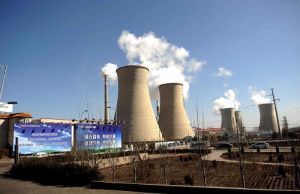In search of the right energy efficiency
 The Shenhua Thermal Powe Plant in Inner Mongolia Autonomous Region. China faces a series of fundamental dilemmas related to energy and electricity use. |
From 2005 to 2009, the average price of retail electricity more than doubled in China, and for some particular regions, the National Development and Reform Commission (NDRC) has increased electricity prices from the equivalent of 1.7 cents more than 4 cents per kWh.
The energy policy and energy efficiency challenges are particularly stark for many Chinese provinces. In December 2007 and January 2008, for example, 17 provinces announced shortfalls in electricity supply because of a combination of rapidly rising industrial demand for electricity, severe weather, interruptions in shipment of coal, and rising price of crude oil. Many of these provinces curtailed electricity use by initiating rolling brownouts with grave consequences for economic development.
To better understand the challenges to promoting energy efficiency in China - one of the best, cheapest, and quickest options of response to increases in energy demand - the author and two of his colleagues collected data from a survey distributed to 600 Chinese households. The survey results reveal four troubling trends.
First, the results suggest general awareness and knowledge about electricity is low. More than 40 percent households did not know the size of their monthly electricity bills. Only 2 percent of the respondents said they had got information and brochures on energy saving and energy efficiency, or could describe ways to actually improve efficiency and reduce electricity use. About one-third said they did not know appliances still consumed electricity when turned off but plugged in. About 45 percent said they had never thought about conserving electricity or using energy efficiently before, and 10 percent (perhaps oddly) said they knew how to save electricity but had decided not to.
Broken down into types, only one-fifth of the households with children said they intended to save electricity or promote energy efficiency. For those who showed an interest in saving electricity, cost was the most important factor (accounting for more than 90 percent of responses) rather than environmental protection.
Second, about 38 percent of the respondents who live in urban areas said local regulators - property managers - do not allow solar water heaters to be installed. These officials believe that solar water heaters are subject to significant leakage and seepage that can damage and destroy roofs and homes. One-quarter of our own survey respondents said much of the same thing, that a majority of solar water heaters in the market are of poor quality and that companies do not test their products or offer decent warranties.
Complicating the matter further, many retailers remove the labels from solar water heaters, making it all but impossible to distinguish well manufactured ones from the dodgy. One example should suffice to prove the seriousness of the problem of deficient technology: About 100 brands of solar water heaters are sold in Liaoning province but no more than 30 are officially registered and certified.
Third, our survey data show 44 percent of the electricity consumed in households in 2008 was on electric appliances. To increase economic growth, the NDRC subsidizes new purchases of TV sets, refrigerators, washing machines, air conditioners and computers. In 2008, for example, buyers were eligible for a 10 percent discount on new appliances if they were used to offset older models, and the government's economic stimulus package had more than $2 billion in incentives, rebates, and subsidies for home appliances.
Because of these factors, more than 90 percent of the respondents said the more convenience appliances could offer the more units they would purchase (and the more energy households will consume).
Fourth, our study highlights some serious problems with the government-managed energy efficiency labeling and product identification program. Only 35 percent of the respondents believed that the energy efficiency labels accurately described how the products would perform, and 25 percent said they did not care about the label at all when selecting products.
The fact is that Chinese consumers believe that there are systematic errors among both manufacturers (that is, they lie to the government) and the governments (that is, they mismanage the program and are incompetent) in the supervision of the labeling process.
The energy efficiency policies have to swim upstream, too, against other incentives for consumer goods, manufacturing, appliance purchasing, and electricity generation. These other Chinese policies, especially NDRC subsidies for new electric appliances, may be working at cross purposes to energy efficiency goals.
These four problems suggest that government policies and programs need to be augmented and modified. Additional subsidies and rebates can help households find the capital needed to invest in energy efficient lights and appliances. Incandescent lamps and other inefficient devices could be taxed, phased out, or even banned outright. Targeted incentives could be designed to force stores to stock and sell more energy efficient products. Rigorous performance standards should be established for solar water heaters, and government regulators need to find ways to ensure that these standards are enforced. And education programs need to overcome resistance and lack of consumer awareness relating to electricity consumption and energy efficiency labels.
In essence, household energy efficiency gains can do much to alleviate many of the energy challenges being faced by China - but they will not occur automatically, and without changes in public policy.
The author is an assistant professor with National University of Singapore.
 0
0 






